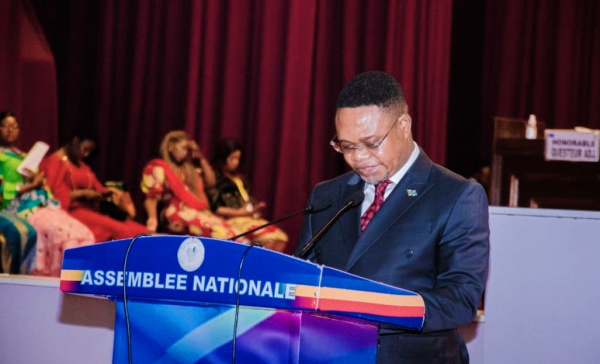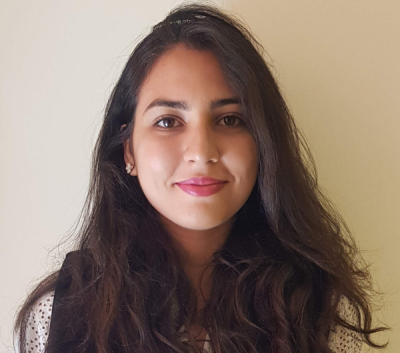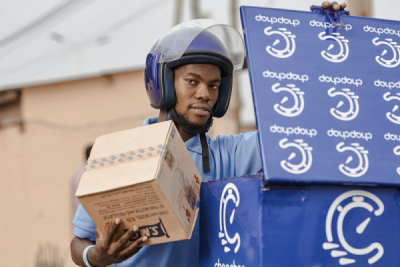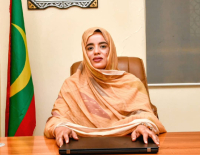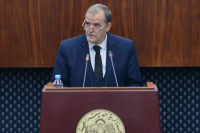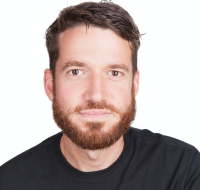Like most African countries nowadays, DRC is particularly focused on developing its digital economy. Since the creation of its Ministry of Digital Affairs, the ministry has taken several actions to make digital technologies tools for integration, good governance, economic growth, and social progress.
Last Tuesday, the DRC parliament pre-approved the digital law presented by Digital Minister Désiré-Cashmir Eberande Kolongele (photo). According to the official, "the adoption of this legal framework aims to regulate the new digital economy, secure investment in the sector and oversee this large sector by seeking a balance between, on the one hand, the freedom principles- including economic freedom and freedom of speech, information and opinion and the right of assembly- and, on the other hand, privacy protection and the protection of public order.”
On August 26, 2022, during a ministerial council, President Felix Tshisekedi instructed the elaboration of a legal framework that would govern the country’s digital transformation. On October 14, the government approved the framework after reviews and comments from some specialized international organizations.
The digital law focuses on cybersecurity, the establishment of a law governing digital activities and services, and the establishment of bodies, and specific public institutions to support and control the digital ecosystem. Those bodies are namely the Digital Regulatory Authority, the National Authority for Electronic Certification, the Data Protection Authority, and the National Agency for Cybersecurity. The digital code also focuses on the establishment of rules organizing the security and protection of digital information systems.
It should be noted that the new law, which is now under thorough review, will complement the law of November 25, 2020, on telecommunications and information technology and communication. Indeed, that law had shown weaknesses because it does not take into account the protection of personal data, cybersecurity, and cybercrime.
Samira Njoya
The solution aims to help law enforcement agencies help as many people as possible in some of DRC’s regions where residents are faced with numerous security challenges.
SOS Secours is a digital solution developed by Congolese start-up Yangu. It helps users notify the startup and get help when their lives are endangered. It has an Android app that can send alerts or even report incidents.
With the app, users can send geolocalized alerts by just shaking their phones. They can also “use the call and messaging options to notify the relatives they selected when activating the app,” Yangu explains.
When it receives an alert, Yangu -thanks to a team of experts- analyzes the threat and sends support or emergency help as needed. The startup also analyses the various threats to pinpoint the locations where users can face such threats at a given period.
Adoni Conrad Quenum
She got her agritech business idea during an academic internship. With some of her classmates, she developed a system to reduce the post-harvest losses incurred by smallholder farmers in her country. Thanks to her system, she has earned several awards and recognitions.
Sara Benlafqih (photo) is a Moroccan industrial management engineer. She is also the CEO and one of the co-founders of agritech startup BMTA&C which develops innovative solutions to challenges like access to energy and food insecurity.
Through BMTA&C, she created a storage unit to help farmers extend the shelf life of their crops from 2 to 20 days. The unit uses a solar cooling system to help smallholder farmers in remote areas reduce crop losses in Morocco and the sub-region.
The said unit was inspired by a discovery Sara made during an academic internship. Indeed, she found out that farmers used to lose almost one-third of their harvest yearly just because they had no storage facility. The storage unit she created can now store up to six tons of fruit and vegetables without using coolants, which are harmful to the environment.
“By giving access to clean, reliable, and affordable energy, our technology promotes food security, fights climate change, and improves farmers’ livelihoods,” Sara told Forbes in early 2022.
Before launching BMTA&C, the CEO who holds an MSc in industrial management engineering interned at various companies and organizations. In June 2017, she was a blue-collar intern at OCP SA, a mineral exploration firm. The following month, she spent a two-week summer internship at Cardiff Metropolitan University. In April 2018, she took on a 1-month shadowing internship at the mining firm Group Managem.
From June to August 2018, she was an engineering intern at the Portuguese group Águas de Portugal (AdP). Her last internship was in 2019 with an end-of-studies internship at the Mohammed VI Polytechnic University, where she got her MSc in industrial management engineering.
In 2017, she was a speaker at the Dean’s Forum held at MINES ParisTech. The following year, she was also a speaker at the Economy Days, in Lyon, Paris, where the discussions revolve around the growth of the digital sector in Africa.
Nominated for the Aviram Awards - Tech for Humanity launched by the Aviram Family Foundation and Forbes to celebrate the most impactful startups in the Middle East and North Africa in 2022, Sara Benlafqih's startup participated in the four-month accelerator program, MassChallenge Switzerland 2022. In 2021, it was in third place in the EDF Pulse Africa 2021 innovation competition and was the Grand Prize winner of the Global Food Challenge.
Melchior Koba
Nigeria's ambition is to digitize its whole public sector and boost internet access across the country. For that purpose, it is building relationships with countries that share the same goals.
Nigeria's Vice President Yemi Osinbajo (photo, left) recently started a working visit to the Socialist Republic of Vietnam. On Monday, December 5, 2022, he was welcomed by his Vietnamese counterpart, Madam Võ Thị Ánh Xuân (photo, right), at the Presidential Palace in Hanoi.
During that welcome meeting, the two parties signed a defense cooperation agreement and expressed their commitment to strengthening their long-standing bilateral relations by working together in the areas of the digital economy, and telecommunications, among others.
According to Prof. Osinbajo, “there are vast opportunities that exist for cooperation and collaboration, especially in the area of digital economy and telecoms.”
“We look forward to accelerating the process, ensuring that those agreements are signed because they are vital to the collaborations that we will see between our countries in the coming years,” he added.
Both countries have great potential in the digital economy and telecommunications in their respective continents. In its report "E-Government Survey 2022 The Future of Digital Government", the United Nations Department of Economic and Social Affairs (UN DESA) said that Vietnam ranks 86th out of 193 countries with a high e-government index. Nigeria ranks 140th in the world with an average e-government index.
The bilateral collaboration they plan to strengthen will therefore enable Nigeria to benefit from Vietnam's extensive experience in digitizing services, deploying telecommunication services, and profit Nigerians, who will benefit from public e-services.
“We have close 120 million of our citizens who have put to use telecoms equipment or devices. And also, broadband connectivity is vastly improved. We hope that by 2025, we will have broadband connectivity for all of our over 200 million people,” Prof. Osinbajo said.
Samira Njoya
The Dubai-based company can now offer its services in Ghana since it is now complying with the local law, which requires service providers to have a presence in the country.
Tech-enabled payment solutions provider Network International Holdings will open a new office and data center in Ghana. This was announced in a release, dated December 5, issued by the holdings.
“Ghana is an exciting market for digital payments and innovation, and we are delighted to launch our office and data center to offer customers, banks, and entrepreneurs smooth and secure payment services. We look forward to supporting businesses as they grow and reach new customers,” said Addo-Quaye (photo, left), Managing Director of Network International Ghana.
With that office, the holding is establishing a local presence to provide innovative solutions that drive customer and profitability and help businesses and economies thrive by simplifying commerce and payments in the Ghanaian market.
Network International's launch in Ghana comes against a backdrop of accelerated digital transformation and increased consumer preferences for convenient, frictionless payment options. In June, Ernest Addison, the governor of the Bank of Ghana, noted that the volume of instant payment transactions has grown from 420,000 cedis (about US$52,800) in 2016 to 31.4 billion cedis in 2021. In addition, cash in circulation in the country as a proportion of gross domestic product (GDP) has dropped from 6.8 percent in 2016 to 4.7 percent in 2021, while the number of checks used per capita has dropped from 25.67 in 2016 to 18.9 in 2021.
Network International wants to take advantage of these shifts and create more partnerships with companies in the digital payments space in Ghana to offer customers more payment options and boost financial inclusion.
The company has a presence in Africa’s largest markets, including Nigeria, South Africa, Kenya, Egypt, and Ghana. It also operates in almost all of the other African countries.
Samira Njoya
The solution was launched to provide reliable and quicker courier and delivery services.
ChapChap is a digital solution developed by Togolese start-up GLC Services. It allows users to get packages delivered through its web platform or mobile application.
According to Alao Lawal, one of GLC Services’s co-founders, ChapChap is an outstanding platform launched to meet the demand of organizations that need quick and reliable courier services.
From the solution’s online platform or its mobile app -available for Android and iOS devices-, users can create their accounts and start placing delivery orders. Once they place orders, they can track them via the embedded geolocation feature.
ChapChap also gives users the possibility to plan when the parcels or any type of package should be delivered to the recipient. It also allows e-tailers to integrate its API into their platforms.
According to PlaySgtroer data, the Android version of ChapChap has been downloaded more than a thousand times.
Adoni Conrad Quenum
With formal training in information technology and banking and finance, she helps entrepreneurs fulfill their ambition. Apart from being a business advisor, she also runs a startup incubator.
Zeinebou Abdeljelil (photo) is a Mauritanian tech entrepreneur and a financial management consultant. She holds two master's degrees, one in banking and financial support services from IFID in Tunisia and the other in business and IT from ISG in Tunisia. She also completed a six-week program on entrepreneurship at the University of Notre Dame’s Mendoza College of Business in the United States.
With a firm belief that innovation and digital technologies have the potential to drive sustainable and inclusive growth in Africa, she co-founded – in 2014- Hadina RIMTIC, the first incubator focused on ICTs in Mauritania. Through her incubator, she organizes pitch competitions (MauriApp Challenge or the entrepreneurship marathon) and, to date she has supported more than 100 projects in the field of digital, livestock feed production, natural compost, and solar energy equipment.
“ There is a need to build the capacity of entrepreneurs in Mauritania, whether it is in the ideation of their projects, in the financial and day-to-day management of their start-ups, or in building their resilience to shocks,” she said earlier this year.
In 2015, she also co-founded IKLAAA Consulting, an agency aimed at building entrepreneurs’ capacities with strategic counseling and management advice. Apart from her entrepreneurship career, the Mandela Washington Fellowship Alumni has over a decade-long professional and consulting experience. Her professional career started, in 2010, with BAMIS Bank where she was a corporate relations manager.
In 2016, UNDP hired her as a capacity-building consultant for small and medium producers in Mauritania. After three months of working for the UNDP, she joined the anti-inequality non-profit organization, Oxfam Intermón, as a microfinance consultant in her country. In 2017, she officiated as a youth entrepreneurship development consultant for the World Bank Group and a Peace consultant for the United Nations Population Fund (UNFPA). The following year, she worked for Caritas Mauritania as a youth entrepreneurship development consultant.
Melchior Koba
Henceforth, with this technology, Algerian companies will have to encode their information in barcodes stamped on the products manufactured locally.
Barcoding products has become a compulsory requirement in Algeria. The Minister of Trade and Export Promotion, Kamel Rezig (photo), announced this requirement last Saturday at the Bar code information day held at the National Agency for the Promotion of Foreign Trade in Algiers. According to Minister Kamel Rezig, the reform aims to facilitate exports and avoid falsifications.
The reform follows the interministerial order on technical regulations governing the stamping of barcodes on products intended for human consumption issued on February 16, 2021, by the Algerian Ministries of Trade and Industry.
In August 2020, the Minister of Trade announced the upcoming elaboration of a regulatory text governing barcoding in the country. At the time, he said that in the following five years, all the Algerian products manufactured and packaged locally for human consumption would be barcoded once it becomes mandatory.
To date, 11,410 companies operating on the national market have requested and obtained their barcodes, which they have stamped on more than 500,000 products destined for human consumption. The remaining companies are called to get up to date because “once the deadline passes, the products without barcodes will be considered illegal and banned,” Kamel Rezig says.
Samira Njoya
According to Interpol, Africa saw a sustained rise in cyberattacks in 2020, including a 238 percent increase in those targeting online banking platforms. As Internet use intensifies, cyber threats are becoming major concerns.
Over the past decade, in Africa, investments in broadband Internet and digital transformation have steadily increased to match the needs. The investments helped boost internet penetration from 9% in 2012 to over 30% this year. They also enabled 48 countries to perform great in the e-government development index. This growth in the continent’s digital adoption carries some risks, however. It did open up opportunities in health, education, commerce, and entertainment but it also heightened cybercrime risks.
In its upcoming report "The downsides of digital revolution: Confronting Africa's evolving cyber threats", the Global Initiative Against Transnational Organized Crime states that Africa is currently under threat from four main categories of dangers that are fostered by the development of a poorly controlled digital world. They are likely to have an increasing effect on conflict, peace, and security in Africa if the digital shift is not properly prepared.
The first category is organized crime, which increasingly relies on digital technologies to enhance and diversify its activities. Then there is the risk of sabotage of critical infrastructure, including attempts to weaken or destroy national, governmental, or military infrastructure, equipment, or systems and penetration of the financial and energy sectors across Africa. The third category is cyber espionage and attempts to penetrate systems to extract sensitive information while the last is innovation in armed conflict or the use of digital technology to facilitate organized violence, such as the proliferation of fake news on social networks to incite a mob or the deployment of unmanned aerial vehicles.
These cyber threats have so far benefited from a fertile breeding ground due to the weak protection of African cyberspace. Only 18 of Africa's 54 countries have developed national cybersecurity strategies, which are needed to define the scale and scope of a country's cybersecurity challenges, assign government-wide responsibilities for monitoring and responding to threats, and guide external support.
On the continent, 22 countries have National Computer Incident Response Teams (CIRTs), which are groups of key stakeholders and experts that monitor major threats and help countries recover from significant security incidents. Only fifteen have ratified the Budapest Convention on Cybercrime or the African Union Convention on Cybersecurity and Data Protection, which strengthen international cybersecurity cooperation.
According to the Global Initiative Against Transnational Organized Crime, to thwart the pitfalls of digital transformation, African countries need to raise public and private actors’ awareness of cybersecurity issues, develop a skilled workforce, improve the regulatory and technical framework and enhance regional and international cooperation. Otherwise, it says, they could miss out on the US$180 billion potential the digital economy has to add to GDPs (according to the IFC and Google) by 2030.
Muriel Edjo
The tech enthusiast has acquired several years of professional software development experience working for African and British firms. With his startup Deimos, he helps companies migrate their data to the cloud.
Andrew Mori (photo) is a South African tech entrepreneur. In 2018, he co-founded Deimos, a Cape Town-based cloud-native security development and operations startup that he heads as the CEO.
Deimos was launched to help companies improve the services they offer. With its software engineering, cloud security, and platform modernization services among others, it helps avoid costly decision errors by giving them access to scalable, high-performing, and reliable systems.
“Our company is focused on helping businesses make smart decisions, particularly from the cloud perspective. It’s imperative to note that migrating to the cloud, if done incorrectly, can be a very costly, difficult, and demoralizing experience. So having vast experience before starting Deimos, I can help companies mitigate risks. Deimos is assisting companies looking to modernize their software systems,” its CEO told TechCabal in November 2022, during an episode of the My Life in Tech podcast. The startup, which currently operates in South Africa, Nigeria, and Kenya, is Google Cloud’s largest partner in Africa. It is also a certified and experienced Amazon Web Services and Azure solutions architect.
Its CEO entered the professional world in 2007, working as a junior researcher at South Africa's Council for Scientific and Industrial Research (CSIR). In 2010, he spent seven months as a lecturer at Blake Hall College in the UK. He was later hired as a software engineer by Radical Company (from 2010 to 2011).
In 2012, he joined InventCommerce where he was successively lead Software Engineer and Technical Assurance Manager. In 2014, Konga Online Shopping appointed him as software engineering manager. In 2015, he became the associate director of engineering for the e-commerce firm before being promoted to the position of director of technology in 2016.
Melchior Koba
More...
During the Covid-19 pandemic, remote education proved a crucial choice to ensure education continuity in Africa. Since then, the edtech segment has been growing steadily with a growing number of Africans adopting this option to further their education.
Sweetch is an e-learning platform developed by a Cameroonian eponymous start-up. It allows its users access to paid and free educational content online. It aims to create new opportunities for people and businesses by leveraging emerging technologies.
The platform has a mobile application -accessible for Android and iPhone users- that enables users to register accounts to access the courses. The edtech offers a multitude of academic and professional courses as well as masterclasses in various fields. Users can choose to learn at their own pace by defining their schedules. They can learn by watching high-quality videos and reading slides and PDFs and asking coaches questions when they don’t understand some topics.
The platform also offers live courses, training, and workshops. Learners can interact with the trainers, which greatly expedites the learning curve. Learners can also take part in live events such as webinars, fairs, conventions, forums, exhibitions, etc.
In June 2022, Sweetch was claiming over 2,500 members and setting its sight for 10,000 members and 200 trainers by January 2023. It also hopes to expand to 15 countries in the next 24 months.
Adoni Conrad Quenum
The project aims to encourage innovation, develop the local ICT ecosystem and contribute to the effective implementation of digital transformation.
In Senegal, the national ICT Observatory plans to develop an upgraded platform to promote the emergence and development of digital companies. Last Friday (December 2), the Ministry of Telecommunications organized a workshop to present the US$3 million project.
The project will be implemented by the United Nations Development Programme (UNDP) in partnership with the UNESCO Regional Office for Education in Africa (BREDA), the UNESCO Regional Office in Dakar, and the Senegalese branch of the Internet Society (ISCO).
According to Isaac Cissokho, Secretary General of the Ministry of Telecommunications, with the digital sector growing steadily in Senegal, it is crucial to "create an environment that can inspire emulation among the various actors of the ecosystem.”
The future platform will allow a better understanding of ICT adoption in the country and provide harmonized and quality data to guide the formulation, implementation, and review of ICT policies.
Before the proper upgrading works, a study on the use of digital tools and services will be carried out to ensure that the sector creates value in Senegal.
Samira Njoya
After her engineering studies, she worked in the media industry in the MENA region before venturing into the food industry. Her foodtech startup now has the confidence of several investors.
Egyptian-born Dalia Abou Omar (photo) is the CEO and co-founder of Brotinni, Egypt's first food technology, and butchery solutions company.
Through her startup, founded in 2020, she launched a platform that enables users to order fresh, hand-cut, and ready-to-cook meat and poultry products that can be delivered by its drivers. The startup recently opened its first warehouse to better serve its clients in Cairo. It is also working on the production of sealed bags to extend its fresh meats’ shelf life to 45 days.
In early November 2022, it raised US$600,000 during a funding round led by Innlife. “We are thrilled to receive our very first round of funding, which will enable us to scale our operations, invest heavily in marketing to increase awareness as well as expand the size of our fleet to keep up with customer expectations around speed and accuracy,” Ms. Dalia commented.
The entrepreneur graduated from the Misr University for Science and Technology, in 2000, with a bachelor's degree in engineering.
A well-known radio and TV presenter, she entered the professional world, in 2004, working as a TV Presenter for Dubai TV. Between 2008 and 2014, she was also a radio presenter for the Egyptian radio station Nugoom FM. Concurrently (between 2009 and 2013), she was also a TV presenter for Al Hayat TV Network. She held the same position for On TV between 2014 and 2015. In 2012, She joined Filmhouse media as general manager before being appointed as director of production and marketing by Dubai-based Tanweer Group, in 2016. In 2019, the smart ad network Adzily hired her as director of marketing and public relations.
Melchior Koba
Humanitarian institutions are usually faced with many challenges, including logistics problems, when working in unstable and insecure regions. Some parties are testing solutions to facilitate remote project management.
Last Thursday, the African Development Bank (AfDB) announced the roll-out of the RASME (Remote Appraisal, Supervision, Monitoring, and Evaluation) project in Angola, after a 3-day training.
RASME is a suite of tools and processes to collect data in real time. It was developed to enable AfDB, its clients, and development partners to better prepare projects, and progress reports, and assess impact openly and transparently.
According to the AfDB Group country manager for Angola, “this project can significantly enhance the data collection which we use to assess the effectiveness of our development work here in Angola.”
“It is significant that we are launching RASME in partnership with the Government of the Republic of Angola,” he added.
The data-gathering tool is the result of a partnership between the African Development Bank's Information Technology Department (CHIS), the World Bank's Geo-Enabling Monitoring and Supervision Initiative, and the KoBoToolbox Foundation, a non-governmental organization affiliated with the Harvard Humanitarian Initiative.
With RASME, AfDB staff, including project and sector managers, country and regional program managers, and government officials will now be able to compile project-related information directly from the field, using a smartphone, tablet or laptop, drones, and satellites. Data can be collected in a variety of formats: text, video, graphics, and even survey responses.
To date, RASME has been deployed in fourteen African countries, including Gabon, Cameroon, Chad, the Democratic Republic of Congo, the Central African Republic, and Mozambique. According to Dra Rossana Silva, Head of the International Economic Cooperation Department at the Angolan Ministry of Finance, "ensuring open and transparent reporting of our development initiatives is central to our mission. RASME is an important enhancement of our capacity to do this.”
Samira Njoya


